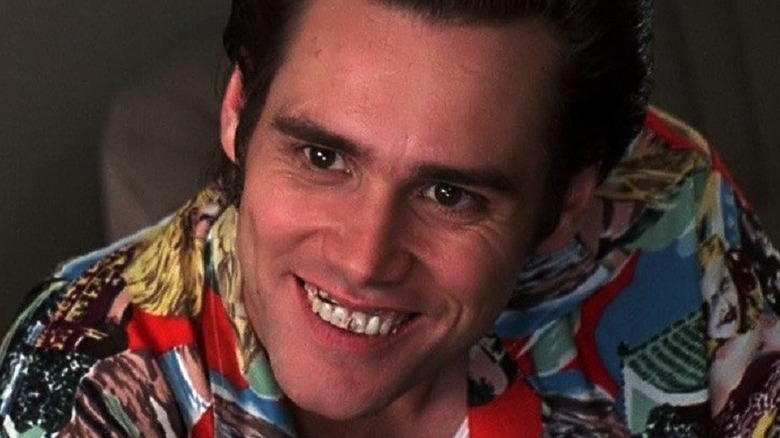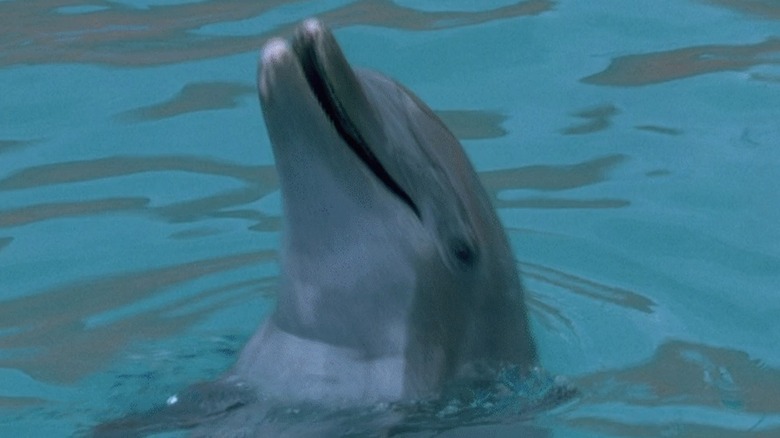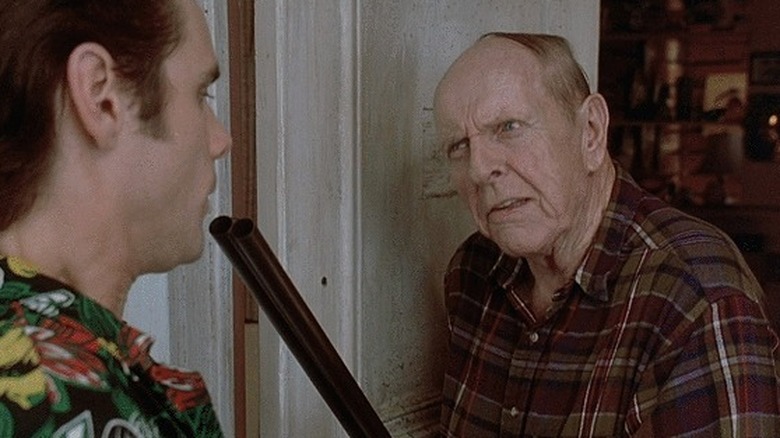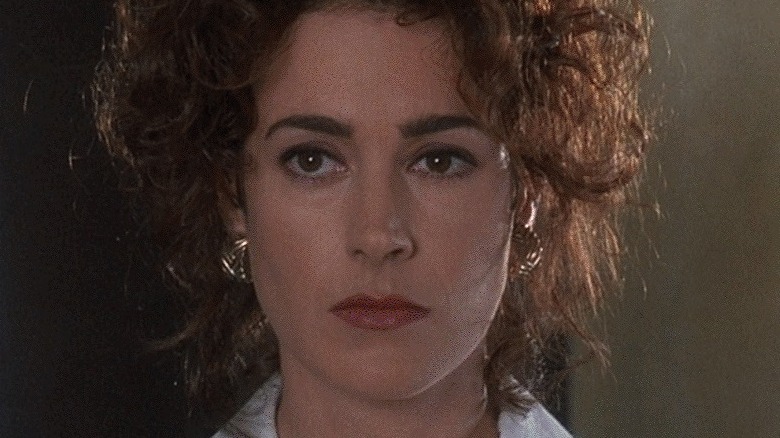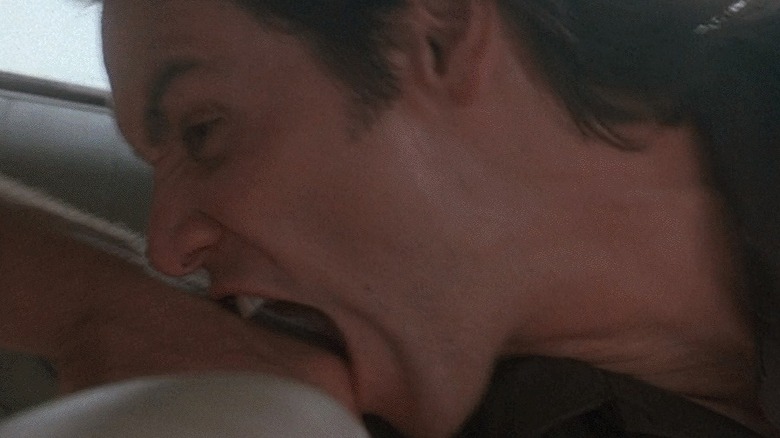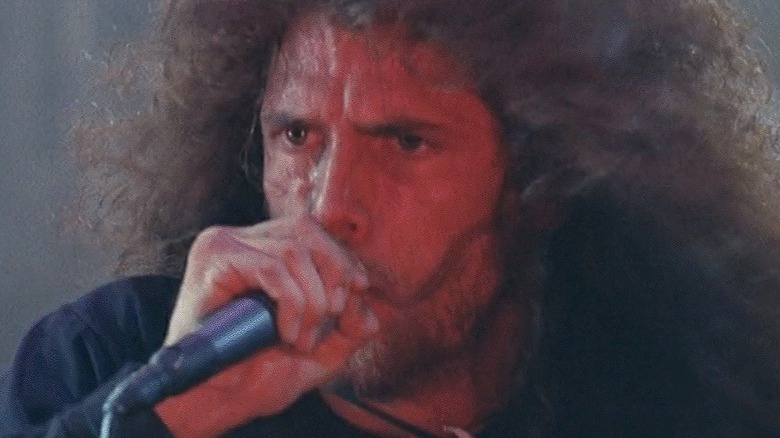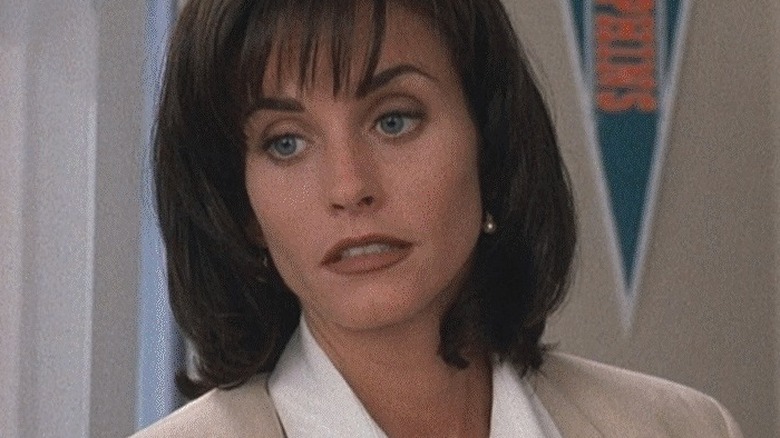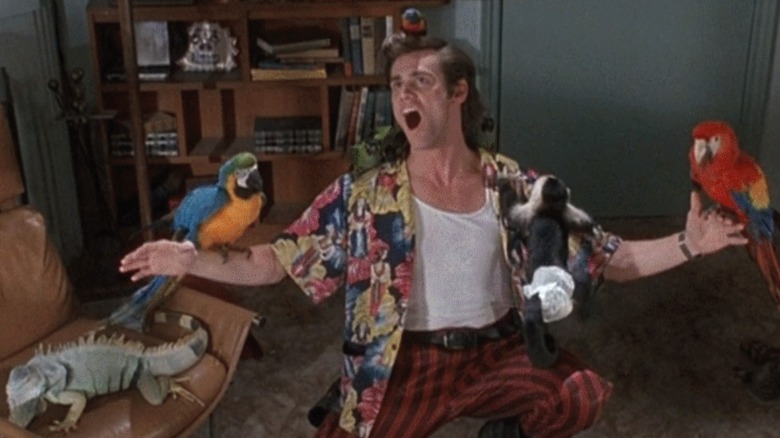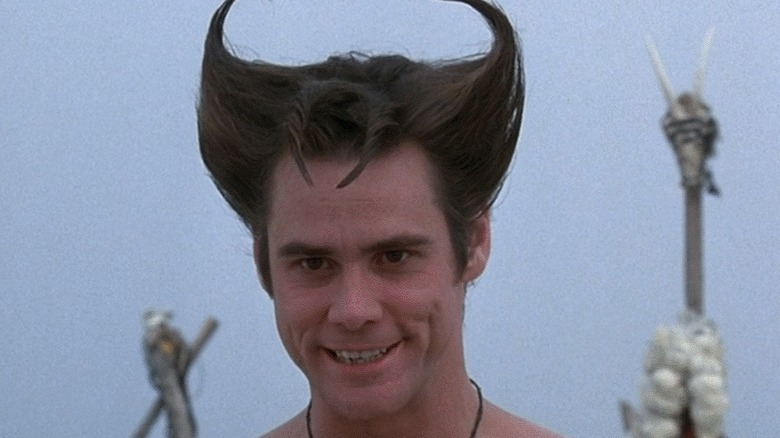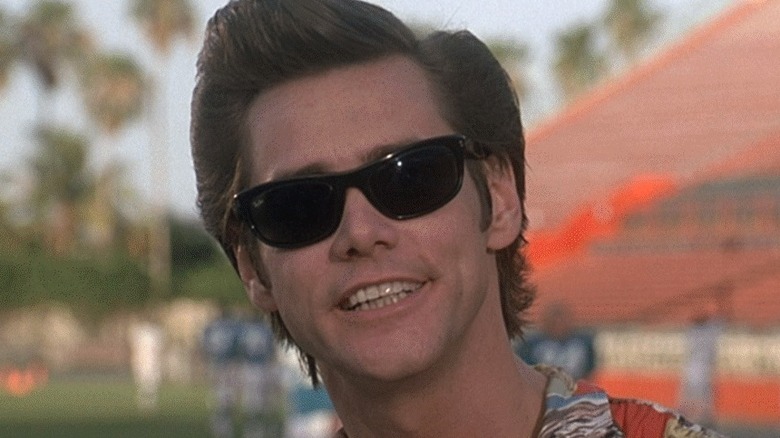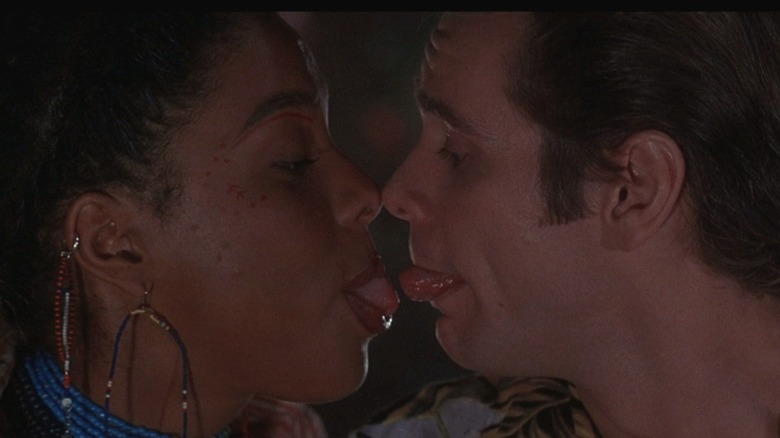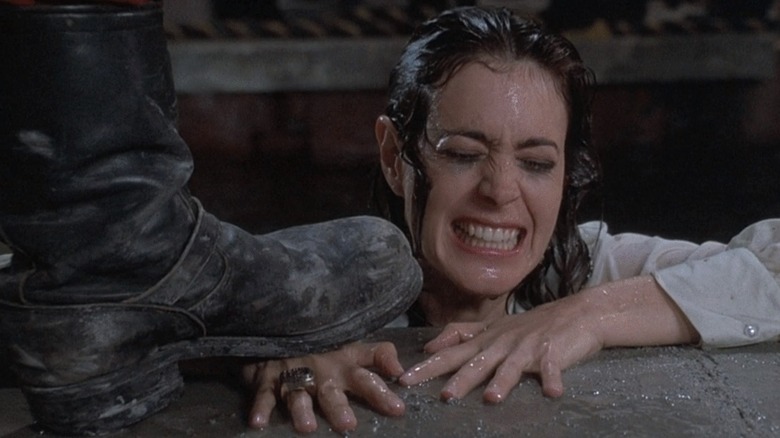The Dark History Of Ace Ventura
"Ace Ventura" is, for better or worse, one of the defining film franchises of the 1990s. The first film was a massive box office hit that catapulted Jim Carrey from regular fame to superstardom for the remainder of the decade, allowing him to star in other hits like "The Mask," "Dumb and Dumber," "Batman Forever," and "Liar Liar."
Regardless of how popular it was at the time, or how much it helped Jim Carrey's career, there is no denying that both "Ace Ventura: Pet Detective" and its sequel "Ace Ventura: When Nature Calls" have not aged well. While the cast is filled with popular actors that are still working today, that doesn't take away from the poorly-written script they were forced to work with. Each film has several different and equally terrible moments that many would find offensive upon re-watch because of how crass, mean-spirited, hateful, or disgusting they are. Even at the time the movie was released, many critics noted just how homophobic the humor proved to be. Some say that comedy is subjective, but that can't excuse everything wrong with a movie that has problematic elements embedded in seemingly every joke.
For those who haven't seen these over-the-top comedy films, they are centered around an outrageous man-child named Ace Ventura who styles himself as a private detective specifically for animals. The first movie features Ace solving the disappearance of the Miami Dolphins football team's mascot (which is a dolphin named Snowflake). The sequel took Ace on a globe-trotting adventure to Africa to solve the mystery of a missing sacred bat. No matter where these stories take Ace Ventura, he almost always does something offensive to someone along the way. Read on to discover the dark history of Ace Ventura.
Supporting animal captivity
In "Ace Ventura: Pet Detective," one of the most important plot points is focused on finding the kidnapped mascot for the Miami Dolphins football team and returning it to the team. Although the movies try to portray Ace Ventura as an animal lover, it's a little suspect that he is so willing to return an animal to a life of captivity instead of setting it loose in the wild. Ace has no problem bringing a majestic dolphin like Snowflake back into its miserable existence as a sports mascot, being paraded around for the amusement of humans.
Keep in mind that some scientists believe dolphins are among the most intelligent animals on the planet and might be second only to humans, per Science.org. These are creatures with a deep understanding of their surroundings, as well as an emotional capacity to feel pain in ways that are not fully understood. This can be seen clearly in how dolphins in captivity have been studied going through different stages of suffering because of their imprisonment away from the ocean, according to World Animal Protection. Having an animal-loving detective like Ace Ventura support dolphin captivity, even passively, goes against everything that a character like this should theoretically represent. Sports teams having live animal mascots at all is generally considered pretty uncool these days, with PETA declaring that it's worthy of an F score.
Invasions of privacy
As a private detective, Ace Ventura is never afraid to push the boundaries of people's privacy during his investigations. It should come as no surprise that these moments go well beyond what would be acceptable for any private investigator and would basically be considered illegal by actual law enforcement. These movies seem to want Ace's behavior to be amusing and lighthearted, but when looking at it objectively it just feels more creepy than anything.
One example of this is in "Ace Ventura: Pet Detective" when Ace decides to take his investigation to the parents of one of his suspects. He goes to their home unannounced and seemingly uninvited to interrogate them about their son, a former football player. While the movie doesn't portray this as wrong, it would be very inappropriate to just show up asking questions to the family of someone without any probable cause. This is further exacerbated in a scene where Ace Ventura impersonates an incoming patient at a mental hospital in order to sift through the private records of an actual patient. Not only is this morally suspect, but this kind of privacy invasion would violate a person's HIPPA rights to protect people's medical information, per the U.S. Department of Health & Human Services.
Einhorn/Finkle plot is bigoted
The portrayal of Sean Young's character in "Ace Ventura: Pet Detective" is one of the vilest parts of this franchise, and has been heavily criticized by critics and audiences alike for its homophobic and transphobic portrayal of a transgender person. Within the context of the story, the film reveals that Sean Young's character, Lt. Lois Einhorn, is actually the mentally unstable football player Ray Finkle who had not yet undergone gender reassignment surgery. When Ace discovers the truth of their identity, he immediately launches into the most over-the-top reaction possible, using a plunger on his own face to induce vomit. Every aspect of this plotline is horribly offensive, and even Jim Carrey himself has admitted in hindsight it could have been done much differently (per Showbiz CheatSheet).
Regardless of hindsight, it was unacceptable to include this plotline in an otherwise goofy comedy movie about animals. This portrayal of a trans person is tasteless, unsympathetic, and cruel for how it paints Sean Young's character as a villain whose identity grosses out everyone in the movie. It also makes a joke out of Ace's deeply homophobic reaction to kissing Einhorn earlier in the film. Thankfully, "Ace Ventura: Pet Detective ” has been re-evaluated in recent years to account for how bigoted this plotline was (via The Mary Sue).
If you or a loved one has experienced a hate crime, contact the VictimConnect Hotline by phone at 1-855-4-VICTIM or by chat for more information or assistance in locating services to help. If you or a loved one are in immediate danger, call 911.
Lots of physical assault
Violence is one of Ace Ventura's key character traits, and there are multiple instances throughout the franchise (per IMDb) where he physically assaults people, usually after he usually starts conflict in the first place. In fact, "Ace Ventura: Pet Detective” starts with one such moment by introducing Ace Ventura as a liar, trickster, and violent man while trying to kidnap someone's dog. In this scene, he impersonates a delivery man, destroys a package, kidnaps a dog, and then leads the owner on an insane chase that culminates with Ace Ventura biting him. It's a bizarre series of events that quickly show the kind of person this character is.
This is seen even more clearly in the climax of the first film. There, Ace Ventura reveals the true identity of Lt. Einhorn to the entire Miami Police Department by tearing off her clothes in full view of everyone. As mentioned previously, this entire plotline is horrible for myriad reasons but the awful fight scene between the two characters is particularly upsetting due to the level of violence displayed. After being held at gunpoint, Ace proceeds to viciously attack Einhorn with punches and kicks before systematically ripping off parts of her clothes to expose her to an audience of police officers. This is a genuinely disturbing moment that serves as a prime example of how much physical assault and abuse appear in the "Ace Ventura" movies.
If you or someone you know is dealing with domestic abuse, you can call the National Domestic Violence Hotline at 1−800−799−7233. You can also find more information, resources, and support on their website.
Cannibal Corpse cameo
While there's nothing inherently wrong or immoral about certain types of art, it is hard to deny that some art is meant to push boundaries by making people uncomfortable. That's exactly the case with the death metal band Cannibal Corpse, who makes a prominent cameo appearance in the first Ace Ventura movie.
Cannibal Corpse is a notorious death metal band that has been around since the 1980s and is mainly known for its over-the-top horror aesthetic and gag-inducing songs about countless taboo subjects, as explained by Almostfear Entertainment. The band writes music themed around violence, death, gore, murder, sexual assault, and even more depraved topics that shouldn't be talked about in detail. In "Ace Ventura: Pet Detective," the band shows up during a scene to play one of their songs titled "Hammer Smashed Face." Ace seems to enjoy the heavy metal show and navigates through the headbanging mosh pit crowd with a smile on his face. When asked about this strange cameo by Vice, the members of Cannibal Corpse claimed that Jim Carrey's people reached out to them about appearing in the movie since he was apparently a fan of death metal. Regardless of why they showed up, it's hard to ignore that a seemingly lighthearted comedy movie features a musical guest like Cannibal Corpse and the grotesque music they promote.
Ace is pretty sexist
In both "Ace Ventura: Pet Detective" and "Ace Ventura: When Nature Calls," Jim Carrey's leading man character regularly displays varying levels of sexism when interacting with women. In some cases, he's openly disrespectful to them by acting like a total moron and wasting their time, like in his first interaction with Melissa Robinson. In their first meeting, Ace eats handfuls of sunflower seeds while she attempts to explain the dolphin kidnapping situation, after which he leaves their nasty shells directly on her desk. While not actively malicious, it still displays Ace's disrespect for a woman in a position of power that he tends not to show for male characters as often.
Additionally, Ace Ventura seems to consistently make unwanted advances toward women he's attracted to by making inappropriate remarks to them. This happens in the first movie when he's introduced to Lois Einhorn by making comments about how she "turns him on." He does this again in the sequel by pining after the princess of the tribal village he's staying in by claiming that he can't sleep with her because of his newfound vow of celibacy. Regardless of which example you choose, it's clear Ace Ventura consistently treats female characters with an uncomfortable amount of disrespect throughout these movies.
Too many exotic pets
Ace Ventura is supposed to be a character that loves animals and has a special relationship with nature, but he often finds himself as the owner of unethical exotic pets throughout the series. As FindLaw notes, ownership of exotic animals as pets can be a serious crime in many places since a lot of these animals are improperly cared for, illegally trafficked, and abused by their owners.
Some of the animals that Ace Ventura has gathered under his command are macaws, sea otters, honey badgers, monkeys, squirrels, lizards, raccoons, penguins, and just about everything in between. Where he acquired these animals and how he's properly taking care of them in his shabby Los Angeles apartment are not explained in the film, which tacitly implies that these exotic creatures are being mistreated by a madman like Ace Ventura. This problem is worsened in the sequel thanks to the relationship between Ace and his pet capuchin monkey named Spike who follows him around everywhere he goes. Capuchin monkeys are deeply intelligent animals that experts claim should not be taken as pets since they don't thrive in a home environment (per the RSPCA). Capuchin monkeys, like many animals, need stimulation by interacting with other members of their species out in the wild rather than being accessories to humans like Ace Ventura.
Racist undertones
One of the worst elements of "Ace Ventura: When Nature Calls" is the racist undertones throughout the story as Ace navigates his investigation into the disappearance of a sacred bat while in Africa. This film relies heavily on racial stereotypes as well as Western-centric myths of African culture like poverty and archaic living conditions, per Global Citizen. This stereotyping is an embodiment of the character Ace Ventura himself.
The story takes Ace to the non-existent African nation of Nibia on behalf of the also non-existent Wachati tribe. This representation of tribal culture is an alienating conglomeration of every stereotypical element of what Americans assume rural Africa must be. This tribe is portrayed as spear-wielding, bat-worshiping warriors who Ace Ventura seems to have little respect for. In one scene, he purposefully desecrates a special altar of the tribe when nobody is looking just to cause trouble. Furthermore, the movie tries to balance this by having a different nonexistent tribe refer to Ace as a "White Devil." Everything about the way the "Ace Ventura" films portray other cultures is consistently tasteless, mean-spirited, and offensive.
Critics hated it
Although "Ace Ventura: Pet Detective ” was a box office hit when it was released in 1994, that doesn't change the fact that it was mostly panned by critics across the board for several different issues (many of which have been discussed in this piece). The film was considered crass, stupid, annoying, confusing, offensive, and tasteless even at the time of release. Some notable critics such as Roger Ebert harped on just how unfunny the movie turned out to be by saying that the movie was a "long, unfunny slog" worthy of only one star.
While some critics did note the dark elements of the film mentioned previously, the biggest thing they seemed to chastise about "Ace Ventura" is the character of Ace himself. Several contemporary reviews reiterate how obnoxiously annoying Jim Carrey's performance as the wacky pet detective felt, and how his immature attempts at humor felt flat (via Rotten Tomatoes).
Relationship with princess
In terms of problematic sexist aspects of Ace Ventura's behavior, perhaps the biggest example of this is his relationship with the Wachati Princess in "Ace Ventura: When Nature Calls." This character is portrayed as a beautiful virginal bride-to-be who attempts to seduce Ace Ventura as he tries to discover what happened to the tribe's sacred bat. Their biggest scene together shows Ace struggling to contain his lust while the two are having a fireside conversation, since he cannot act upon his feelings after taking a spiritual vow to remain celibate. This is undercut entirely by the end of the film when it's revealed that the princess is no longer a virgin after spending time alone with Ace, which causes him to be chased away for his indiscretion.
It's obvious to audiences how the white savior trope, as detailed by Healthline, plays out in this film, but his inappropriate relationship with the princess is particularly hard to watch. Not only is she portrayed as young and naïve, but she is also shown to be the one trying to seduce Ace Ventura at first because of his heroism in looking for Shikaka the bat. She even exposes herself to him in an attempt to make him break his vow, which he ends up doing by the end of the story. This dynamic is a bizarre way to try and frame Ace Ventura as an irresistible hero while making his eventual decision to sleep with the princess seem acceptable. Unfortunately for the film, it doesn't work.
Ace Ventura is mean
What can be surprising for fans re-watching both "Ace Ventura: Pet Detective" and "Ace Ventura: When Nature Calls" is how genuinely mean-spirited the movies are. Ace Ventura is a mean, cruel, and dishonest character who is constantly hurting everyone around him whether they deserve it or not. This wouldn't be the first time that Jim Carrey played an overly-mean role, as he was known for being a real jerk on the set of other films like "The Grinch" back in the early 2000s.
As for Ace Ventura, he seems to thrive on being as unpleasant to people as humanly possible throughout both major films in the franchise. This is a character who lies, cheats, steals, attacks, and snarks his way through every situation in order to achieve his often misguided goals. At some point, all his obnoxiously annoying behavior and thinly-veiled insults become exhausting to endure.
